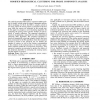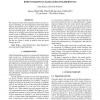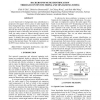INTERSPEECH
2010
14 years 9 months ago
2010
101
click to vote
INTERSPEECH
2010
14 years 9 months ago
2010
In speaker-adaptive HMM-based speech synthesis, there are a few speakers whose synthetic speech sounds worse than that of other speakers, despite having the same amount of adaptat...
119
click to vote
INTERSPEECH
2010
14 years 9 months ago
2010
Sparse Component Analysis is a relatively young technique that relies upon a representation of signal occupying only a small part of a larger space. Mixtures of sparse components ...
110
click to vote
INTERSPEECH
2010
14 years 9 months ago
2010
This paper proposes a technique for speaker and language adaptive training for HMM-based polyglot speech synthesis. Language-specific context-dependencies in the system are captur...
113
click to vote
INTERSPEECH
2010
14 years 9 months ago
2010
Interlocutors are known to mutually adapt during conversation. Recent studies have questioned the adaptation of phonological representations and kinematics of phonetic variables s...
116
click to vote
INTERSPEECH
2010
14 years 9 months ago
2010
We present a new method for speaker verification that uses the diversity of information from multiple feature representations. The principle behind the method is that certain feat...
104
click to vote
INTERSPEECH
2010
14 years 9 months ago
2010
This study revisits the face-to-tongue articulatory inversion problem in speech. We compare the Multi Linear Regression method (MLR) with two more sophisticated methods based on H...
183
click to vote
ICASSP
2010
IEEE
14 years 9 months ago
2010
IEEE
The under-determined blind source separation (BSS) problem is usually solved using the sparse component analysis (SCA) technique. In SCA, the BSS is usually solved in two steps, w...
120
click to vote
ICASSP
2010
IEEE
14 years 9 months ago
2010
IEEE
Pure frequency-based audio fingerprint systems have the capacity of handling very short fingerprints while being highly robust to perturbations such as additive noise or compressi...
195
click to vote
ICASSP
2010
IEEE
14 years 9 months ago
2010
IEEE
A novel framework for background music identification is proposed in this paper. Given a piece of audio signals that mixes background music with speech/noise, we identify the musi...




